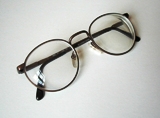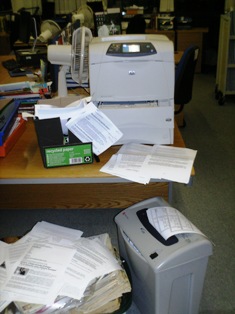The advent of the paperless society?
(continued)
Environmental and health issues
|
The impact of paper production and disposal on the environment is being widely discussed; however, the frequent replacement of computer hardware and software turns out to be detrimental to the health of planet and people, too. A stark example: in developing countries, workers taking machines apart are already dying of the toxic metals.
|
| |

|
The impact of paper production and disposal on the environment is being widely discussed; however, the frequent replacement of computer hardware and software turns out to be detrimental to the health of planet and people, too. A stark example: in developing countries, workers taking machines apart are already dying of the toxic metals.

|
| |
The effect of computers and monitors on our health is not yet known, but it has been assumed that prolonged exposure may have serious consequences, such as infertility or cancer. The strain on the eyes is also greater than through reading print. Some research points out that the likelihood of glaucoma – which can lead to total blindness – rises through visual display units.
|

Photos: freeimages.co.uk (microchip, spectacles), freedigitalphotos.net (computer), Christina Egan (printer, books)
|
| |
Besides, computers have not so far decreased but increased the amount of paper used up! Will this tendency not continue with customising and printing on demand, and with ever more sophisticated scanners and printers? Then we would still raze the forests and also have to clear up the mounds of noxious plastic and metal.
"In [Dalal's] research into the waste produced by office workers, she found that 21 percent of black-and-white copier documents were returned to the recycling bin on the same day they were produced."
John Markoff
in The International Herald Tribune,
27 Nov 2006
|
Conclusion
|
When I started working on this "paper" – which has drawn from and will be passed on through both electronic media and printed paper – I thought it would be easy to prove that in the 21st century, we need the computer and the book side by side.
|
| |

|
| |

|
I considered the computer a tool to create and manage the media of the print and audio-visual eras – printed text and image, sound and film recordings – and also as a medium in its own right, already irreplaceable in its capacity to set up databases, for instance. In both cases, I essentially saw computers, however powerful, as an extension of print.
Yet even during my brief research on this topic, I realised that new forms of communication and creation are emerging, and that we are in the midst of a revolution of pyramidal dimensions, of which most people are not aware, despite the global, everyday, presence of computers. In particular, I find Robert Darnton’s idea of the "layered" e-book, to customise and print, shocking and alluring. It is not even possible to classify it as an electronic or print medium any more. The "pyramid" book might be the third way of the future, but will not eliminate paper at all.
Jay David Bolter’s model of the "hypertextual" world engages the reader in new ways, but bids farewell to five basic concepts of the print era: the text, the book and the journal, the author and the copyright. Many writers would not be happy with leaving the fruit of their brain at the disposal of a global library in this way. The integrity of the work of art is especially at stake. I firmly believe to the concept of inspiration by a creator. Perhaps it can coexist with that of a collective or continual imagination.
I still support the warnings which Neil Postman developed with regard to television in the eighties and hold that without printed and indeed handwritten documents we shall lose much of our logical thinking – as we have lost much of our memory capacity when we abandoned an oral culture for a written one. We might need new skills for new media, but they should be balanced out against the old, so that we may become the most rounded humans yet and not the most fragmented.
Even when everyone in the world is both literate and computer-literate, access to information will by no means be free and equal. Society and economy would have to change, and I mean in dictatorships as well as democracies; new media do not miraculously create knowledge or justice by themselves.
I hope my essay has been worthwhile reading.
Would you like to take part in a short poll about your own use of printed and electronic material?
Thank you very much for your interest!
[Go to short poll]
[Go to references]
[Back to introduction]
Christina Egan, M.A.
Library Assistant - Cataloguing
Institute of Education
University of London
Tel.: 020 7911 5335
E-mail: c.egan@ioe.ac.uk
Last updated: 9 Dec 2006




